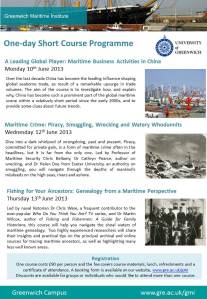Tag: Martin Wilcox
Fishing for Your Ancestors: Genealogy from a maritime perspective (A one-day short course)
Greenwich Maritime Institute is pleased to announce its first short course on maritime genealogy. Led by naval historian Dr Chris Ware, a frequent contributor to the ever-popular Who Do You Think You Are? TV series, and Dr Martin Wilcox, author of Fishing and Fishermen: A Guide for Family Historians, this course will help you navigate the shoal waters of maritime genealogy. Two highly experienced researchers will share their insights and practical tips on the principal archival and online sources for tracing maritime ancestors, as well as highlighting many less well known areas.
Greenwich Maritime Institute is pleased to announce its first short course on maritime genealogy. Led by naval historian Dr Chris Ware, a frequent contributor to the ever-popular Who Do You Think You Are? TV series, and Dr Martin Wilcox, author of Fishing and Fishermen: A Guide for Family Historians, this course will help you navigate the shoal waters of maritime genealogy. Two highly experienced researchers will share their insights and practical tips on the principal archival and online sources for tracing maritime ancestors, as well as highlighting many less well known areas.
Among the key sources covered will be:
- Naval muster rolls and pay books
- Continuous service records
- Officers’ logs
- Crew lists
- Certificates of competence and service
- Passenger records
- Records of apprentices
- Company and personal papers
The course will take place on Thursday 13th June from 9.30am – 4.30pm. The cost is £90 per person which includes lunch, refreshments, course materials and a certificate of attendance. A booking form can be found on the Greenwich Maritime Institute website: http://www2.gre.ac.uk/about/schools/gmi/study/short/programmes
PUBLIC HISTORY SEMINAR: ‘The “Poor Decayed Seamen” of Greenwich Hospital, 1705-1763.’
UNIVERSITY OF GREENWICH PUBLIC HISTORY SEMINAR
Wednesday 24 OCTOBER 5pm in Queen Anne 063
‘The “Poor Decayed Seamen” of Greenwich Hospital, 1705-1763.’
Dr Martin Wilcox (GMI) and Linda Cunningham (University of Greenwich History Graduate and Discover Greenwich Yeoman)
The Royal Hospital for Seamen at Greenwich was founded in 1694, to house elderly and disabled seamen who had served in the Royal Navy. The first pensioners were admitted in 1705. The Hospital was established on a grand scale, and its buildings, now home to the University of Greenwich, remain one of London’s finest landmarks and centrepiece of the Greenwich World Heritage Site. The history of the institution, at least in its broad outlines, is well known, but until now little research has been conducted into the men who inhabited it.
The Poor Decayed Seamen of Greenwich Hospital was a one-year project funded by the University of Greenwich and conducted by Dr Martin Wilcox, who has constructed a database of admissions to the Hospital up to 1763. The database incorporates information from the Hospital’s Entry Books, which by the 1740s give details of every pensioner’s age, birthplace, place of last abode, time rank in the navy, marital status, number of children, and whether and how he was injured. The Entry Books are complemented by information drawn from the Hospital directors’ minutes and letters, and from petitions of pensioners seeking re-admission after discharge or expulsion. From these it has been possible to draw up a detailed profile of Greenwich pensioners in the first six decades of the institution, and also draw some wider conclusions about the eighteenth-century seafaring labour force.
Linda Cunningham, a Greenwich History graduate, has also undertaken research into the lives of the Greenwich pensioners using newspapers and other archival sources. Together, Linda and Martin will bring a new perspective to the life and times of the Greenwich pensioners.
The database, containing more than 8,000 entries, will shortly be placed online as a resource for family historians and academic researchers alike.
